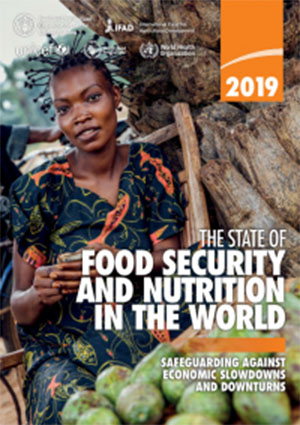The prevalence of overweight school-age children, including children in the Caribbean, arising out of ill-advised food consumption habits and less than adequate exercise regimes could be one of the major health challenges looming on the global horizon according to UNICEF’s recently released report on The State of Food Security and Nutrition in the World.
Obesity, according to the Report is “increasing in all age groups, with particularly steep increases among school-age children.” It tags so-called ‘junk food habits and a lack of exercise as the principal reason for what it says is a disturbing, growing trend.
Throughout the world, most school-age children do not eat enough fruit or vegetables, regularly consume fast food and carbonated soft drinks, and are not physically active on a daily basis, the Report says.
Responding to the assertions made in the UNICEF Report, local teachers with whom the Stabroek Business spoke last week say they largely share the views expressed in the report, even though some say that local climate conditions and exercise might mitigate weight gain, a problem in temperate countries. However, all of the seven teachers with whom this newspaper spoke concede that for other health-related reasons, fast food consumption is ‘a growing issue.” They place the blame for the problem on both parents and the education system which, one senior primary school teacher told this newspaper, has over the years, “refused to focus on what school-age children eat and how much they exercise.” The teacher who declined to be named but told Stabroek Business that he works as a Senior Master at a primary school on the East Coast of Demerara, said that he was “not at all surprised” by the observation made in the UNICEF Report. “What we are finding is that on the whole, fewer children, particularly those who attend school in Georgetown, walk with their lunches. Soft drinks and fast foods have become a craze. It is what the children seem to want and unfortunately many parents give in to their children.”
Another teacher employed at a prominent privately-run Secondary School told Stabroek Business that fast food consumption is “not an issue” at the school, which he admits is attended by “mostly middle class children” who “eat fast foods and drink sodas literally every day. The school[’s] administration does not make that an official concern,” she added. The same teacher pointed out that many schools have no structured physical education programmes “so that there are, in some cases, no structured in-school exercise programmes for the children. It is as if we have come to accept, in most cases, that what happens in the classroom is the only important thing as far as the school’s responsibilities are concerned,” she said.
A female Head Teacher told this newspaper that the problem of unhealthy eating habits among schoolchildren was largely a function of “the absence of any kind of rules-based system. The fact is that there are no rules set by parents, the Ministry or the schools themselves that have to do with what the children eat. Some parents actually drop off their children’s fast foods lunches and there is nothing that the schools can do to stop it.” Asked to comment on the relatively modest number of children who bring home-cooked meals to school the Head Teacher declared that “unfortunately, it does not seem that greens and vegetables are a favourite part of the diet preference of schoolchildren.”
Part of the response mooted in the UNICEF report is the placing of a limit on the “fats, salt and sugars,” which are significant components of fast food offerings. “I believe that when reports like the UNICEF Report make that kind of pronouncement, both parents and the school system have a responsibility to act to limit the consumption of fast foods. At schools, that responsibility is ours. Parents have to help do the rest,” the Head opined.
The UNICEF report calls for “multifaceted, multi sectoral approaches” to what it describes as an “obesity epidemic.” It says that any meaningful response must include “policies to protect and increase the availability and affordability of nutritious foods that constitute a healthy diet.” It also stated that out of a total population of 678 million pre-school 5-year olds, 40 million or 5.9% are overweight whilst out of a total population of 1.2 billion adolescents (10-19 years) 207 million or 17.3% are overweight.”
No region is exempt from the epidemic of overweight and obesity, the report added.










